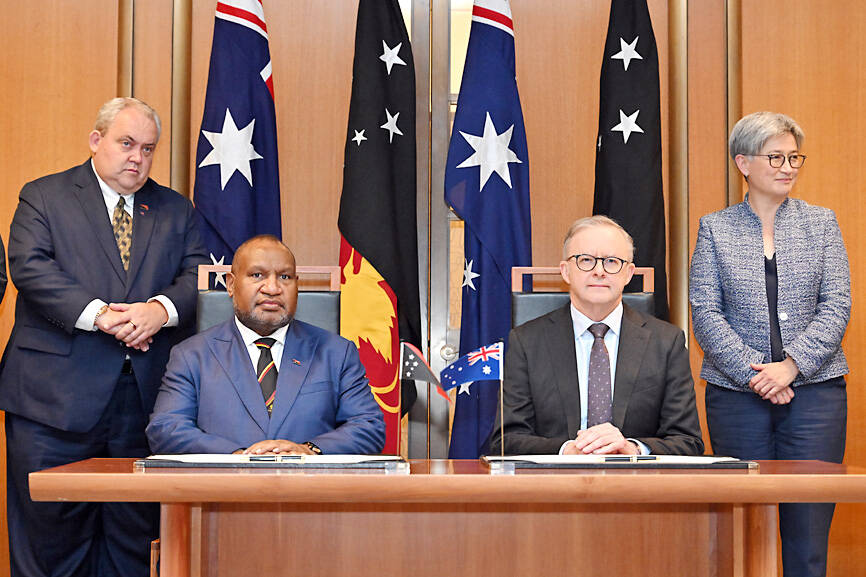Australia and Papua New Guinea (PNG) yesterday signed a security agreement that Australian Prime Minister Anthony Albanese and his counterpart, James Marape, said showed the closeness of the two nations.
The deal is designed to bolster Papua New Guinea’s internal security through more assistance in policing, defense and the judiciary as the Pacific islands’ largest nation seeks to develop its economy.
Amid strategic competition between China and the US in the region, PNG in May signed a defense deal with the US to upgrade its military bases, and is boosting trade ties with China.

Photo: EPA-EFE
Marape told a press conference with Albanese in Canberra that the agreement with Australia showed they were “brother and sister nations,” but added that PNG would not pick sides and had a foreign policy of “friends to all.”
Albanese said the deal “will make it easier for Australia to help PNG address its internal security needs and for Australia and Papua New Guinea to support each other’s security and the region’s stability.”
He paid tribute to the support PNG’s population gave to Australian service members during World War II, and said it was a defense relationship forged through sacrifice.
“For our interests going forward, we have no closer friends than Papua New Guinea,” Albanese said.
PNG’s judiciary, public service and borders were established by Australia before PNG became an independent nation 48 years ago, Marape said.
“You have always given support to us. What happens up north of your borders has deep, deep shared effect, benefit, consequences, on our region,” he added.
Australian Minister for International Development and the Pacific Pat Conroy told the Australian Broadcasting Corp Australia would spend A$200 million (US$131 million) on police training and infrastructure to help PNG double its police force to 10,000 officers.
Australian and other Commonwealth nation police will be hired by PNG to fill gaps in about 50 police management roles on short-term contracts.
The agreement says that enhancing PNG’s capabilities contributes to “Pacific-led regional security and stability,” and that the two nations will prioritize consultations with each other on PNG’s need for security-related equipment, infrastructure and training.
As China has sought to boost its security presence in the Pacific islands, signing deals to equip and train police in Solomon Islands and Vanuatu, where it is a large infrastructure lender, Australia has said security should be provided by Pacific countries.
The Australia-PNG deal says the two nations would consult if there is a threat to peace in the Pacific or an external armed attack on either party.
Conroy said it was “very strong” language that was comparable to commitments in Australia’s security alliance with the US.
The deal also covers classified information sharing, critical infrastructure, cyber, maritime and aviation security, and health.

Kehinde Sanni spends his days smoothing out dents and repainting scratched bumpers in a modest autobody shop in Lagos. He has never left Nigeria, yet he speaks glowingly of Burkina Faso military leader Ibrahim Traore. “Nigeria needs someone like Ibrahim Traore of Burkina Faso. He is doing well for his country,” Sanni said. His admiration is shaped by a steady stream of viral videos, memes and social media posts — many misleading or outright false — portraying Traore as a fearless reformer who defied Western powers and reclaimed his country’s dignity. The Burkinabe strongman swept into power following a coup in September 2022

‘FRAGMENTING’: British politics have for a long time been dominated by the Labor Party and the Tories, but polls suggest that Reform now poses a significant challenge Hard-right upstarts Reform UK snatched a parliamentary seat from British Prime Minister Keir Starmer’s Labor Party yesterday in local elections that dealt a blow to the UK’s two establishment parties. Reform, led by anti-immigrant firebrand Nigel Farage, won the by-election in Runcorn and Helsby in northwest England by just six votes, as it picked up gains in other localities, including one mayoralty. The group’s strong showing continues momentum it built up at last year’s general election and appears to confirm a trend that the UK is entering an era of multi-party politics. “For the movement, for the party it’s a very, very big

ENTERTAINMENT: Rio officials have a history of organizing massive concerts on Copacabana Beach, with Madonna’s show drawing about 1.6 million fans last year Lady Gaga on Saturday night gave a free concert in front of 2 million fans who poured onto Copacabana Beach in Rio de Janeiro for the biggest show of her career. “Tonight, we’re making history... Thank you for making history with me,” Lady Gaga told a screaming crowd. The Mother Monster, as she is known, started the show at about 10:10pm local time with her 2011 song Bloody Mary. Cries of joy rose from the tightly packed fans who sang and danced shoulder-to-shoulder on the vast stretch of sand. Concert organizers said 2.1 million people attended the show. Lady Gaga

SUPPORT: The Australian prime minister promised to back Kyiv against Russia’s invasion, saying: ‘That’s my government’s position. It was yesterday. It still is’ Left-leaning Australian Prime Minister Anthony Albanese yesterday basked in his landslide election win, promising a “disciplined, orderly” government to confront cost-of-living pain and tariff turmoil. People clapped as the 62-year-old and his fiancee, Jodie Haydon, who visited his old inner Sydney haunt, Cafe Italia, surrounded by a crowd of jostling photographers and journalists. Albanese’s Labor Party is on course to win at least 83 seats in the 150-member parliament, partial results showed. Opposition leader Peter Dutton’s conservative Liberal-National coalition had just 38 seats, and other parties 12. Another 17 seats were still in doubt. “We will be a disciplined, orderly